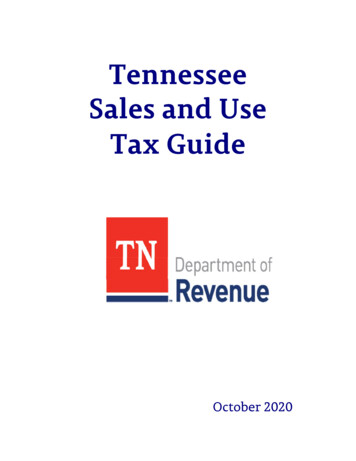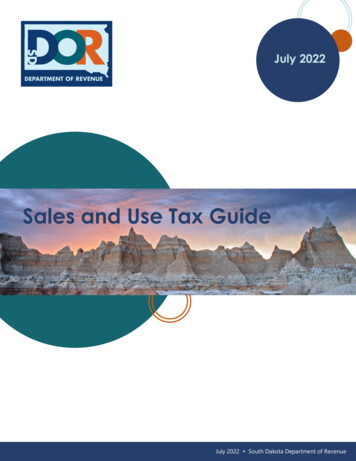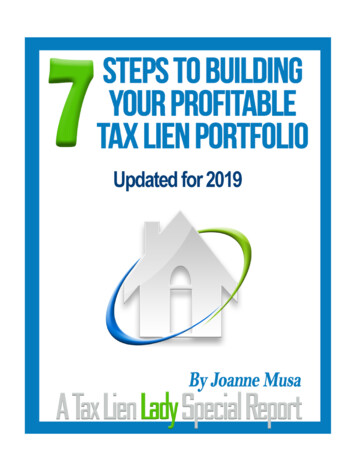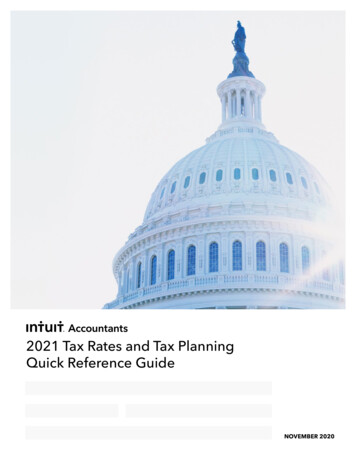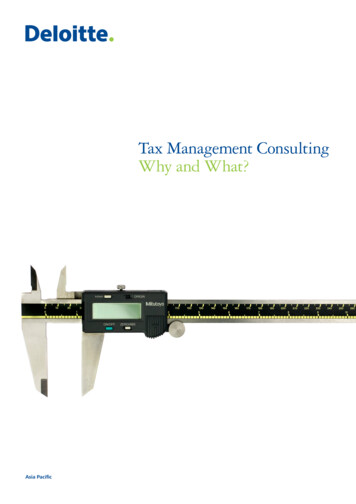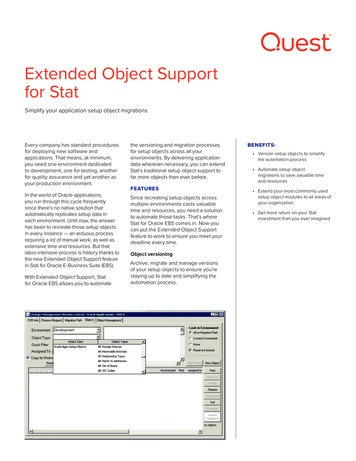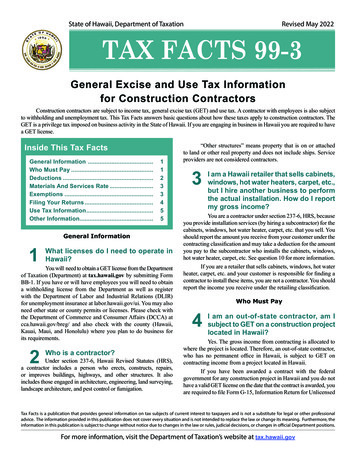
Transcription
State of Hawaii, Department of TaxationRevised May 2022TAX FACTS 99-3General Excise and Use Tax Informationfor Construction ContractorsConstruction contractors are subject to income tax, general excise tax (GET) and use tax. A contractor with employees is also subjectto withholding and unemployment tax. This Tax Facts answers basic questions about how these taxes apply to construction contractors. TheGET is a privilege tax imposed on business activity in the State of Hawaii. If you are engaging in business in Hawaii you are required to havea GET license.Inside This Tax FactsGeneral Information .Who Must Pay.Deductions.Materials And Services Rate.Exemptions.Filing Your Returns.Use Tax Information.Other Information.11233455General Information1What licenses do I need to operate inHawaii?You will need to obtain a GET license from the Departmentof Taxation (Department) at tax.hawaii.gov by submitting FormBB-1. If you have or will have employees you will need to obtaina withholding license from the Department as well as registerwith the Department of Labor and Industrial Relations (DLIR)for unemployment insurance at labor.hawaii.gov/ui. You may alsoneed other state or county permits or licenses. Please check withthe Department of Commerce and Consumer Affairs (DCCA) atcca.hawaii.gov/breg/ and also check with the county (Hawaii,Kauai, Maui, and Honolulu) where you plan to do business forits requirements.2Who is a contractor?Under section 237-6, Hawaii Revised Statutes (HRS),a contractor includes a person who erects, constructs, repairs,or improves buildings, highways, and other structures. It alsoincludes those engaged in architecture, engineering, land surveying,landscape architecture, and pest control or fumigation.“Other structures” means property that is on or attachedto land or other real property and does not include ships. Serviceproviders are not considered contractors.3I am a Hawaii retailer that sells cabinets,windows, hot water heaters, carpet, etc.,but I hire another business to performthe actual installation. How do I reportmy gross income?You are a contractor under section 237-6, HRS, becauseyou provide installation services (by hiring a subcontractor) for thecabinets, windows, hot water heater, carpet, etc. that you sell. Youshould report the amount you receive from your customer under thecontracting classification and may take a deduction for the amountyou pay to the subcontractor who installs the cabinets, windows,hot water heater, carpet, etc. See question 10 for more information.If you are a retailer that sells cabinets, windows, hot waterheater, carpet, etc. and your customer is responsible for finding acontractor to install these items, you are not a contractor. You shouldreport the income you receive under the retailing classification.Who Must Pay4I am an out‑of‑state contractor, am Isubject to GET on a construction projectlocated in Hawaii?Yes. The gross income from contracting is allocated towhere the project is located. Therefore, an out‑of‑state contractor,who has no permanent office in Hawaii, is subject to GET oncontracting income from a project located in Hawaii.If you have been awarded a contract with the federalgovernment for any construction project in Hawaii and you do nothave a valid GET license on the date that the contract is awarded, youare required to file Form G-15, Information Return for UnlicensedTax Facts is a publication that provides general information on tax subjects of current interest to taxpayers and is not a substitute for legal or other professionaladvice. The information provided in this publication does not cover every situation and is not intended to replace the law or change its meaning. Furthermore, theinformation in this publication is subject to change without notice due to changes in the law or rules, judicial decisions, or changes in official Department positions.For more information, visit the Department of Taxation’s website at tax.hawaii.gov
Tax Facts 99-3Revised May 2022Page 2Contractors on Federal Construction Projects, with the Departmentwithin 30 days from date the contract was awarded.5I am a Hawaii contractor, am I subjectto GET on a construction project locatedoutside of Hawaii?No. Gross income from contracting pertaining to realproperty located outside the State is exempt from the GET undersection 237-29.53, HRS. For example, income from architecturalwork done in Hawaii for a hotel being built in Guam is exempt.Complete Form G-61, Export Exemption Certificate, and retain itfor your records. For more information see section 18-237-29.5302, Hawaii Administrative Rules (HAR).6I have a project located in Hawaii andperform part of the work outside ofHawaii, am I subject to GET?Yes. Since the gross income from contracting is allocatedto where the project is located, the gross income from contractingwork performed both in and out of Hawaii for a project located inHawaii is subject to GET.7What is the GET rate on contractingincome?Gross income from contracting is subject to the GET atthe rate of 4% (plus the county surcharge if applicable).82.Both the contractor and the subcontractor have GET licenses;3.The contractor claiming the deduction reports the name,Hawaii Tax I.D. Number, and the amount paid to eachsubcontractor on the contractor’s accompanying ScheduleGE.This deduction is commonly called the subcontract deduction.Example 1: ABC Construction Company (ABC), a contractorwith a GET License, is the prime contractor for the construction ofa building. ABC subcontracts with DEF Company (DEF) to installthe plumbing system. Since DEF is performing contracting workas defined in section 237-6, HRS, DEF qualifies as a contractor.Therefore, ABC is allowed to take the subcontract deduction forpayments made to DEF, provided that ABC properly reports thepayment made to DEF on Schedule GE.11Who can claim a subcontract deduction?A prime contractor and a subcontractor may claim asubcontract deduction if all the requirements in question 10 are met.12If I pay my subcontractors more than Ireceive for the total contract price, canI deduct everything I paid to mysubcontractors?Can I deduct the cost of materials?Can I deduct payments to subcontractors?13Is my contracting income subject to thecounty surcharge?DeductionsNo. The cost of materials cannot be deducted from grossincome subject to the GET.10The Taxpayer is a contractor as defined in section 237-6,HRS;No. For each project, your deductions cannot exceedyour gross income.Example 2: Charlie Construction Company has a contract toconstruct a building for 500,000. Charlie Construction Companysubcontracts the plumbing work to Drain, Inc. for 150,000, theelectrical work to Gray & Associates for 200,000, and the roofingwork to Steeple, Ltd. for 200,000, for a total of 550,000. CharlieConstruction Company must report 500,000 as contracting income.The maximum subcontract deduction that Charlie ConstructionCompany may claim is 500,000. Charlie Construction Companymay not claim the 50,000 of subcontractor payments that exceed itsincome from this project to offset its income from other contractingjobs.Income from contracting is allocated to the taxationdistrict where the job site is located pursuant to section 18-2378.6-03, HAR. If the job site is located in a county that adopted acounty surcharge, the contracting income will be subject to 4.5%GET, which includes the 0.5% county surcharge.91.Yes. Payments made by a contractor to subcontractors,may be deducted from gross contracting income subject to the GETif the following conditions are met (see section 237-13(3)(B), HRS):Can I claim a subcontract deduction ifI buy building materials, supplies, andother goods from a contractor?No. Payments made for construction materials andsupplies to a contractor who is acting as a seller of goods is noteligible for the subcontract deduction.Tax Facts is a publication that provides general information on tax subjects of current interest to taxpayers and is not a substitute for legal or other professionaladvice. The information provided in this publication does not cover every situation and is not intended to replace the law or change its meaning. Furthermore, theinformation in this publication is subject to change without notice due to changes in the law or rules, judicial decisions, or changes in official Department positions.For more information, visit the Department of Taxation’s website at tax.hawaii.gov
Tax Facts 99-3Revised May 2022Example 3: ABC Supply House, a contractor, sells customizedcabinets to Gravel Construction Company, a contractor who installsthe cabinets for its own customers. ABC Supply House is acting asa seller of tangible personal property, not a contractor, and shouldtherefore report its income under “retailing” or “wholesaling,”whichever is applicable. Gravel Construction Company should reportits income under “contracting,” but may not claim the subcontractdeduction for payments to ABC Supply House.Example 4: ABC Supply House also sells and installscabinets for OK Construction Company, a general contractor.Because ABC Supply House installs the cabinets, ABC SupplyHouse should report its income from OK Construction Companyunder “contracting.” Additionally, OK Construction Company mayclaim the subcontract deduction for the amounts paid to ABC SupplyHouse.Materials and Services Rate14Are sales of construction materials andsupplies to me considered wholesaletransactions or retail transactions?Page 3(5) The resale of the contracting is subject to tax imposed underthe GET law at the highest rate.If you are purchasing services at wholesale, provide yourservice provider with Form G-82.16Services rendered to the contractor that do not meet therequirements outlined in question 15 are subject to GET at the rateof 4% (plus the county surcharge if applicable).Costs that are overhead to the licensed contractor also donot qualify for the 0.5% GET rate. Overhead means continuous orgeneral costs occurring in the normal course of a business, includingbut not limited to costs for labor, rent, taxes, royalties, interest,discounts paid, insurance, lighting, heating, cooling, accounting,legal fees, equipment and facilities, telephone systems, depreciationand amortization. See section 237-1, HRS.ExemptionsSales of materials that are incorporated by you into thefinished work and remain perceptible to the senses are consideredwholesale transactions taxed at the rate of 0.5%. If you are makingwholesale purchases, provide your supplier with the applicableresale certificate (Form G-17 or Form G-18). All other sales, suchas sales of equipment, are retail transactions taxed at the rate of4% (plus the county surcharge if applicable).171518What types of services are taxable atthe 0.5% rate?Services rendered to contractors are sales at wholesaleunder section 237-4(a)(10), HRS, and taxed at the rate of 0.5%, ifall the following are met:(1) The benefit of the services passes to the customer ofthe licensed contractor as an identifiable element of thecontracting being sold to the customer;(2) The cost of the services is not overhead to the licensedcontractor;(3) The gross income of the licensed contractor is not divided(does not qualify for income splitting) between the licensedcontractor and another licensed seller or contractor;(4) The gross income of the licensed contractor is not subjectto a deduction under the GET law; andWhat types of services are taxable atthe 4% rate (plus the county surchargeif applicable)?Is contracting work performed for thecounty, state or federal governmentssubject to GET?Yes. Contracting activity with any government entity,including activity performed on government properties such asmilitary bases, is subject to GET.Are there any other GET exemptionsspecifically for contractors?Yes. There is an exemption from GET for the planning,design, financing, construction, sale, or lease for low‑andmoderate‑income housing projects in Hawaii.To qualify for this exemption, the general contractor mustcomplete Form G‑37, General Excise Tax Exemption For Certifiedor Approved Housing Projects, for each contractor or supplierconnected with the project, and submit the forms to the HawaiiHousing Finance and Development Corporation (HHFDC), or, ifa county project, to the appropriate county housing authority forapproval. A copy of the approved Forms G‑37 must be filed withthe tax assessor in the taxation district of the claimant.Also, section 237-29.53, HRS, allows an exemption forcontracting work exported out of Hawaii. See question 5.Tax Facts is a publication that provides general information on tax subjects of current interest to taxpayers and is not a substitute for legal or other professionaladvice. The information provided in this publication does not cover every situation and is not intended to replace the law or change its meaning. Furthermore, theinformation in this publication is subject to change without notice due to changes in the law or rules, judicial decisions, or changes in official Department positions.For more information, visit the Department of Taxation’s website at tax.hawaii.gov
Tax Facts 99-3Revised May 202219Is the sale of goods and services to acontractor who qualifies for the certifiedhousing project exemption subject toGET?Yes. The sale of goods and services to a contractor whoqualifies for this exemption is subject to the GET unless the generalcontractor has submitted an approved Form G-37 to the Departmenton behalf of the subcontractor, supplier, or service provider.20How should I report my deductions onmy GET return when I qualify for thecertified housing project exemption?Once you have your approved Form G-37 from theHHFDC (see question 18), report the exemption in column b ofForm G-45/G-49 up to the approved amount.Example 5: Champion Construction is a prime contractor withan approved Form G-37 on file with the Department for a contractamount of 100,000, ED code 100 amount of 60,000, and amountof tax exempted of 2,400. Of the 100,000 the general contractorreceives for the contract from his customer, he pays his subcontractors 40,000. The general contractor is to submit a separate Form G-37for each of his licensed subcontractors that are working on the project.The general contractor should file his G-45/G-49 returns reporting 100,000 as gross contracting income in column a and 100,000 asan exemption in column b. On Schedule GE, the general contractorshould report 60,000 in Part I 10/100, 40,000 in Part I 10/148,and complete Part III with the required subcontractor information.The subcontractor should report the amount they receive from thegeneral contractor, 40,000 as gross contracting income on theirG-45/G-49 returns and claim an exemption for the certified G-37amount in column b and on Schedule GE Part I 10/100.21If my contracting income is exempt fromthe GET, may I also claim the subcontractdeduction for this same project?No. As stated in question 12, the subcontract deductioncannot be more than the total gross income that would be taxablewere it not for this deduction. Since the income from this project isalready exempt from the GET, you may not also claim the subcontractdeduction.Page 4Filing Your Returns22What tax returns must I file with theDepartment of Taxation?The business must file a Hawaii income tax return toreport the income and expenses for the year. In addition, the businessmust file periodic GET returns (Form G-45) and the annual returnand reconciliation (Form G-49). See the specific form instructionsfor more information.23Should I report my income under“contracting” or “services includingprofessional,” on my GET returns?Contractors, including those engaged in architecture,engineering, land surveying, landscape architecture, and pest controlor fumigation, should report their income under “contracting.”Certain taxpayers, such as architects and engineers, may be engagedin business as both contractors and service providers, depending onthe work performed. An architect or engineer is a contractor when itmanages or designs a construction project. In contrast, an architector engineer is a service provider when it creates a feasibility study orprovides consulting services unrelated to a specific construction job.24How should I report my deductions onmy GET returns when my deductionsare greater than my income?If your deductions exceed your income, you may NOTclaim a refund on your periodic GET return (Form G-45) by reportingnegative taxable income and calculating a credit. You will NOTreceive a refund or credit because no tax has been paid for theperiod. When you file your periodic GET return, if your deductionsare greater than your income for the period, report your allowabledeductions up to your gross income and report any excess deductionson your next periodic GET return and any future periodic GETreturn until claimed in full.When you file your annual GET return (Form G-49), reportyour allowable deductions up to your gross income and report anyexcess deductions on the subsequent period’s Form G-45. You areunable to claim a refund for more than the tax you paid for that year.25Do I need to use the accrual method ofaccounting for GET purposes if I amusing the accrual method of accountingfor income tax purposes?No. Many contractors, particularly those whose contractsextend over several months or who maintain an inventory ofTax Facts is a publication that provides general information on tax subjects of current interest to taxpayers and is not a substitute for legal or other professionaladvice. The information provided in this publication does not cover every situation and is not intended to replace the law or change its meaning. Furthermore, theinformation in this publication is subject to change without notice due to changes in the law or rules, judicial decisions, or changes in official Department positions.For more information, visit the Department of Taxation’s website at tax.hawaii.gov
Tax Facts 99-3Revised May 2022construction materials, use the accrual method of accounting forincome tax purposes. This requires the contractors to report theirGET on the accrual basis. However, contractors can report theirGET on a cash basis provided the contractors notify the Departmentof the basis upon which the GET is to be reported.26How is the income from bonded jobsreported?When a construction project is bonded, payments aremade to the bonding company rather than to the prime contractorfor the project. The bonding company will pay the subcontractors,retain any amounts due to it, and pay the remainder to the primecontractor.The bonding company is only considered a custodian ofthe funds and will only be taxed on its share of the income. Theprime contractor must report as gross income the total contractamount, although it may claim any allowable deductions such as thesubcontract deduction. However, the amount the bonding companyretains is NOT a subcontractor deduction; it is overhead of theprime contractor and not allowed as a deduction.27If a contractor gives a subcontractor thematerials needed for a job and a checkfor the difference between the contractamount and the cost of the materials,what is the subcontractor’s grossincome?Gross income includes the value of any goods and servicesreceived. Therefore, the subcontractor will be subject to the GETon the full contracted amount, and may not exclude the cost of thematerials provided by the prime contractor.Use Tax Information28When does the use tax apply and whatare the rates?The use tax is imposed on tangible personal property,services, or contracting imported for use in Hawaii and acquiredfrom a seller located outside of the State who is not subject to theGET. The use tax is based on the landed value of the property,services, or contracting when they are brought into the State. Thelanded value is the value of the item at the time it arrives in Hawaiiand includes the sales price of the item, shipping and handling fees,insurance costs, and customs duty fees.The use tax is 0.5% on the value of goods, such as buildingmaterials, which a contractor will incorporate into a finished workor project in such a form that they remain perceptible to the senses.Page 5The use tax is 4% (plus the county surcharge if applicable) onthe value of goods, such as tools and equipment, which a contractorwill use but not incorporate into a finished work or project.If the imported services become identifiable elements of thefinished work under the contract, the use tax is 0.5% of the valueof the imported services.In all other cases, the value of the imported services issubject to the use tax at the rate of 4% (plus the county surchargeif applicable).29If I import heavy equipment into Hawaiifor use on a project, is it subject to theuse tax?The import of heavy equipment into Hawaii for temporaryuse on a project is not subject to the use tax. Temporary use meansthe property is located in and used in Hawaii for 365 days or less.30If I import used equipment I bought froma mainland contractor, for use in Hawaii,is it subject to the use tax?No. You may claim an exemption or exclude or apportionthe value of imported property, services, or contracting for usetax purposes when an exemption, exclusion, or apportionment ofgross receipts would be allowed under the GET law in the case ofa similar local transaction.Example 7: A mainland contractor sells a backhoe, which waspreviously used in the mainland contractor’s business, to a Hawaiicontractor who imports the backhoe into and for use in Hawaii. Theuse tax will not apply to this transaction. The Hawaii contractor isexempt from the use tax upon importation of the backhoe becauseif the backhoe had been purchased from a Hawaii contractor, thesale would have been exempt from the GET as a casual sale undersection 237-2, HRS.Other Information31What are federal cost‑plus contracts,and how are they taxed for GETpurposes?Federal cost‑plus contracts are contracts in which thefederal government agrees to reimburse the contractor for the costof material, plant, or equipment used in the performance of thecontract and pay the contractor an additional amount which eithermay be a fixed fee or a percentage.Federal cost‑plus contractors may exclude from gross incomethe amount reimbursed for costs incurred for material, plant, orequipment purchased from a seller with a GET license, provided thatTax Facts is a publication that provides general information on tax subjects of current interest to taxpayers and is not a substitute for legal or other professionaladvice. The information provided in this publication does not cover every situation and is not intended to replace the law or change its meaning. Furthermore, theinformation in this publication is subject to change without notice due to changes in the law or rules, judicial decisions, or changes in official Department positions.For more information, visit the Department of Taxation’s website at tax.hawaii.gov
Tax Facts 99-3Revised May 2022Page 6(1) the reimbursement does not exceed the gross proceeds of saleand (2) the seller certifies to the Department that the seller agreesand elects to report the gross proceeds of the sale as a retail saletaxed at the rate of 4% (plus the county surcharge if applicable).The certification requirement may be satisfied by a statementgiven to the contractor by the seller where the seller agrees and electsto report the sale at the 4% (plus the county surcharge if applicable)retail rate. The contractor should retain the seller’s statement in theevent that the contractor is audited.32Do I need to keep records?Yes. Keep records of your income and expenses. If youhave any employees, you must also keep employment records.Your records will help you to prepare your tax returns. Your recordsmust be able to support what you report on your tax returns. Yourdeductions will be disallowed if your records are not sufficient tosupport your deductions.33Where can I find more information onGET and use tax?The Department has published two brochures: “An Introduction to the General Excise Tax” “An Introduction to the Use Tax”Also available are two Tax Facts: Tax Facts No. 95‑1, “Use Tax” Tax Facts No. 37-1, “General Excise Tax”These publications are available on our website attax.hawaii.gov.Where to Get Forms and InformationWebsite: tax.hawaii.govTelephone: 808-587-4242Toll-Free: 1-800-222-3229Telephone for the hearing impaired: 808-587-1418Toll-Free for the hearing impaired: 1-800-887-8974Tax Facts is a publication that provides general information on tax subjects of current interest to taxpayers and is not a substitute for legal or other professionaladvice. The information provided in this publication does not cover every situation and is not intended to replace the law or change its meaning. Furthermore, theinformation in this publication is subject to change without notice due to changes in the law or rules, judicial decisions, or changes in official Department positions.For more information, visit the Department of Taxation’s website at tax.hawaii.gov
Complete Form G-61, Export Exemption Certificate, and retain it for your records. For more information see section 18-237-29.53-02, Hawaii Administrative Rules (HAR). 6 I have a project located in Hawaii and perform part of the work outside of Hawaii, am I subject to GET? Yes. Since the gross income from contracting is allocated

